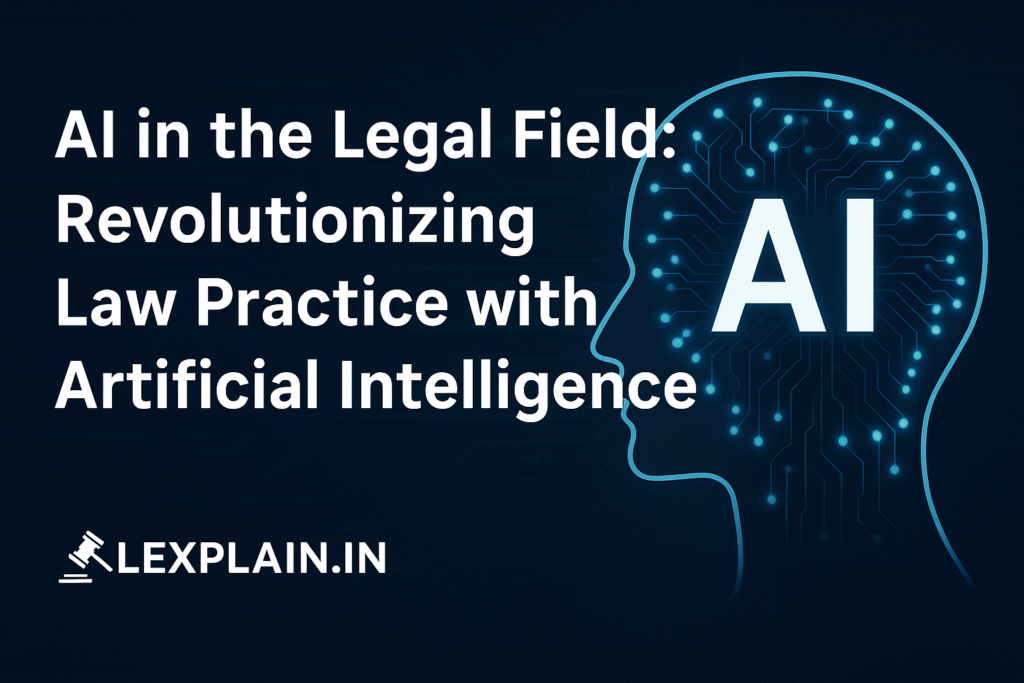AI in Law: A Growing Revolution
Did you know that according to the American Bar Association, 35% of law firms already use AI in the legal field which revolutionizing law practice, and more than 80% of attorneys under 40 believe it will be standard industry practice within five years? This is the beginning of the AI revolution in law, transforming everything from research to courtroom strategies.
- AI in Law: A Growing Revolution
- AI Legal Research: Cutting Hours into Minutes
- AI Contract Review and Drafting
- Predictive Analytics in Law
- AI in Administrative Legal Work
- AI and Access to Justice
- Challenges of AI in Legal Practice
- The Future of Legal Careers with AI
- Human Skills That Will Always Matter
- Closing Thoughts: AI and the Heart of Law
AI Legal Research: Cutting Hours into Minutes
Before AI, lawyers often spent nights scanning legal precedents. Now, AI legal research tools powered by natural language processing allow attorneys to pull up the most relevant case law in minutes. This means lawyers can devote more time to strategy and advocacy, not data gathering.
- Faster case precedent discovery
- Smarter search results with context-based matching
- Reduced workload for junior associates
By adopting AI for legal research, attorneys can save clients time and money while avoiding human error.
AI Contract Review and Drafting
One of the most time-consuming tasks in law has always been contract analysis. With AI contract review software, firms are now:
- Detecting risky or hidden clauses quickly
- Automating the drafting of standard agreements
- Ensuring compliance with complex regulations
For young lawyers, learning how to use these tools means turning a once tedious responsibility into a high-value skill.
Predictive Analytics in Law
Another area where AI in the legal industry is booming is predictive analytics. Based on historical rulings, AI can provide insights about probabilities of success:
- Likelihood a judge will grant a motion
- Expected settlement values in similar cases
- Jury behavior forecasts
This doesn’t replace human judgment but empowers lawyers to make more data-driven strategies—a skill especially valuable for litigation-heavy practices.
AI in Administrative Legal Work
AI isn’t only changing case strategy but also simplifiying legal operations and practice management. From billing automation to scheduling and document filing, legal AI tools cut down on repetitive tasks. This is particularly attractive for solo lawyers and small firms with limited staff.
AI and Access to Justice
Perhaps the most moving element of AI in legal services is its role in democratizing access. Platforms like AI-powered legal chatbots help underserved populations with:
- Fighting traffic tickets
- Drafting small claims court filings
- Understanding basic legal rights
In many ways, AI is making legal help affordable and accessible, breaking down barriers that have excluded millions from fair representation.
Challenges of AI in Legal Practice
No revolution comes without risk. The challenges of AI in law include:
- Algorithmic bias reflecting past injustices
- Data privacy and security issues with sensitive records
- Reduced opportunities for junior lawyers to build foundational research skills
- Over-reliance on technology over human reasoning
Law firms must invest in AI ethics in law to ensure these systems remain trustworthy, fair, and responsible.
The Future of Legal Careers with AI
For 20- to 40-year-olds in law, the future isn’t about being replaced by AI—it’s about learning to use it effectively. The most in-demand lawyers will be those who master AI legal technology while keeping their human skills sharp. Areas of opportunity include:
- Tech + Law hybrid careers: AI regulation, data protection, and digital rights law
- AI litigation specialists: handling court cases involving flawed algorithms
- Legal innovators: combining coding and law to create the next generation of tools
Human Skills That Will Always Matter
No matter how advanced AI becomes, certain skills stay irreplaceable:
- Emotional intelligence in client relationships
- Creativity in negotiations and advocacy
- Moral reasoning in ambiguous cases
- Storytelling in courtroom arguments
AI may provide the data, but it’s the human lawyer who must inspire, persuade, and represent justice.
Closing Thoughts: AI and the Heart of Law
The future of law with AI is not about replacing lawyers but elevating them. AI will handle the heavy lifting—research, drafting, and prediction—while lawyers focus on creativity, empathy, and advocacy.
For young professionals passionate about justice, this is both a challenge and an opportunity. The legal field of tomorrow belongs to those who can merge tradition with technology and human values with machine power. In courtrooms of the future, the winning team will be AI and humans together.

